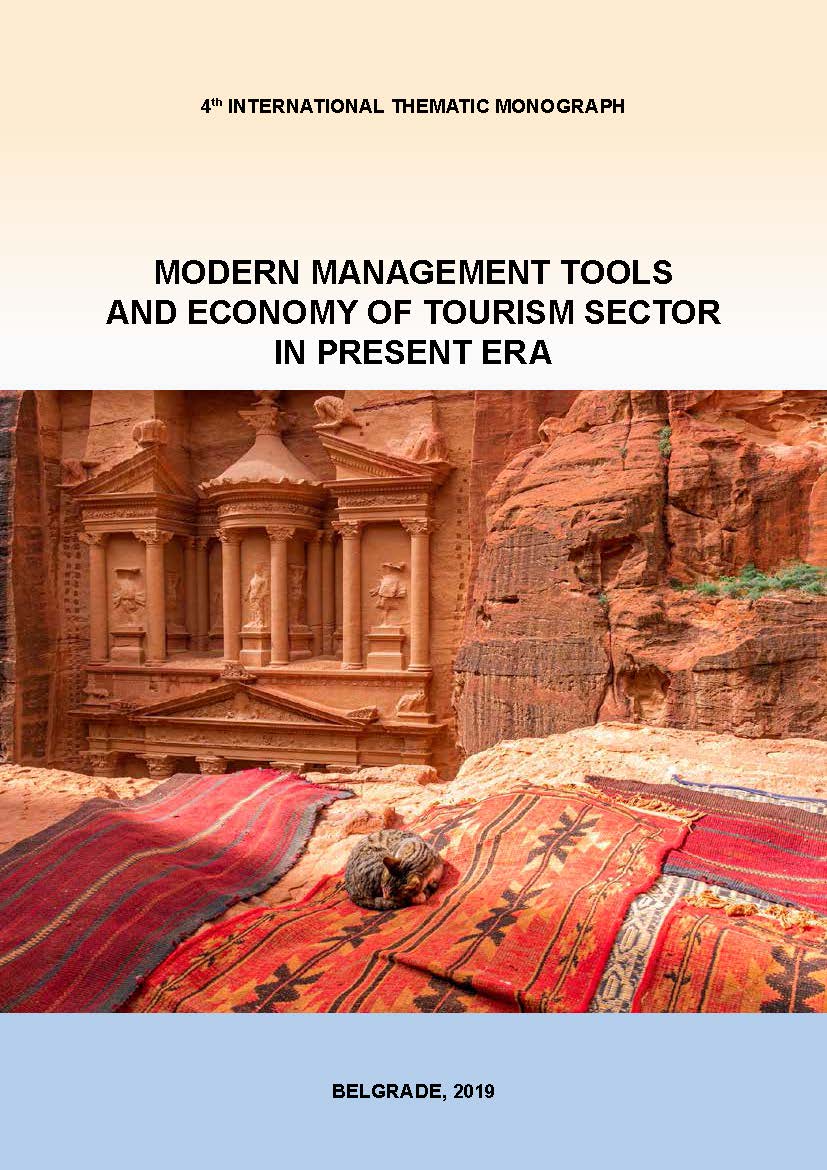|
AGROTOURISM – LEGAL PROBLEMS AND IT PERSPECTIVES Žaklina Spalević Sinergija University, Rade Banjičića, 76300 Bijeljina, Republika Srpska, Bosnia and Herzegovina Miloš Ilić Academy of Southern Serbia – Collage of Agriculture and Food Technology, Cirila i Metodija 1, 18400 Prokuplje, Serbia Vladimir Džamić Singidunum University, Danijelova 32, 11000 Belgrade, Serbia DOI: https://doi.org/10.31410/tmt.2019.139 4th International Thematic Monograph - Modern Management Tools and Economy of Tourism Sector in Present Era, Belgrade, 2019, Published by: Association of Economists and Managers of the Balkans in cooperation with the Faculty of Tourism and Hospitality, Ohrid, North Macedonia; ISSN 2683-5673, ISBN 978-86-80194-29-5; Editors: Vuk Bevanda, associate professor, Faculty of Social Sciences, Belgrade, Serbia; Snežana Štetić, full time professor, The College of Tourism, Belgrade, Serbia, Printed by: SKRIPTA International, Belgrade
|
|
Abstract: The challenge we tried to address in this paper included the consideration of the current state of agritourism in the Republic of Serbia, as well as the possibilities for the improvement of this branch of tourism using information and communication technologies. The current status of agritourism is viewed from two aspects. The first aspect is the application of IT technologies in order to promote the tourist offer, while the second aspect is oriented towards legal norms governing the protection of intellectual property as well as the tourist protection. With the application of IT technologies, individual accommodation establishments that feature agritourism can be presented to a wider range of potential tourists. A better presentation of the existing possibilities undoubtedly leads to an increased number of visits. At the same time, it is necessary to regulate the protection of digital multimedia content created by tourists, as well as the possibility of their usage in promotion of accommodation capacities and tourist offer. Keywords: Digitalization, Web presentations, Cloud, Intellectual property. REFERENCES Andreopoulou, Z., Athanasiadis, D., Papastavrou, A., & Papastavrou, K. (2006). Identifying Drama’s Prefecture as a Tourism Destination through the Presentation of its Natural Environment in the Internet. In Proceedings of International Conference on Telecommunications & Multimedia TEMU, Heraklion, Crete, 5-7 July, 2006, (pp. 1-8). Andreopoulou, Z., Theoharopoulos, D., & Papastavrou, A. (2006), Contribution of the Internet in the Touristic Promotion of Mountainous Communities. Touristic (1), 8-18. Arabatzis, G. & Grigoroudis, E. (2010). Visitors’ satisfaction, perceptions and gap analysis: The case of Dadia–Lefkimi–Souflion National Park. Forest Policy and Economics, 12(3), 163- 172. Bull, A. (2002). Economics of Travel & Tourism. N. York: Wiley. Exarhos, G., & Karagiannis, St. (2004). Agrotourism. The Centre for Technological Research of Crete, CTR-Crete Publications. Grgic, I., Zrakic Susac, M., & Gudelj-Velaga, A. (2015). Agritourism in Croatia and some eu countries. Agronomski glasnik, 1(2), 61-74. Ilic, M., & Spalevic, Z. (2016). Application of electronic services in tourism. In International Thematic Monograph - Thematic Proceedings: Modern Management Tools and Economy of Tourism Sector in Present Era (336-344). Belgrade: Association of Economists and Managers of the Balkans with Faculty of Tourism and Hospitality, Ohrid, North Macedonia. Karagiannis, S., & Stavroulakis, D. (2011). Development of Agrotourism through the Application of Internet Technologies: Problems and Perspectives. In: M. Salampasis, A. Matopoulos (eds.): Proceedings of the International Conference on Information and Communication Technologies for Sustainable Agri-production and Environment (HAICTA 2011), Skiathos, September, 2011 (pp. 8-11). Kizos T., & Iosifides T. (2007). The Contradictions of Agrotourism Development in Greece: Evidence from Three Case Studies, South European Society and Politics, 12(1), 59-77. Lopez, E.P., & Garcia, F.J.C. (2006). Agrotourism, sustainable tourism and Ultraperipheral areas: The Case of Canary Islands. PASOS. Revista de Turismo y Patrimonio Cultural, 4(1), 85-97. Rodriguez, J.P. (2011). Sustainable initiatives in marginal rural areas of Serbia: a case study of Dimitrovgrad municipality, Applied Studies in Agribusiness and Commerce – APSTRACT Agroinform Publishing House, 5(1-2), 7-13. Santucci F.M. (2013). Agritourism for Rural Development in Italy, Evolution, Situation and Perspectives. British Journal of Economics, Management & Trade, 3(3), 186-200. Urosevic, U. (2017). Intellectual Property and Media Photos, Retrieved from: http://boom93. com/info/lokalne-vesti/38245/intelektualna-svojina-i-fotografije-u-medijima.html, date: 25.08.2019. Viduka, D., Basic, A., Lavrnic, I. (2013). Cloud Computing As A Potential Solution In E-Business. Journal of Economics, Management and Informatics - BizInfo, 4 (2), 79-85. Vukovic, P. (2017). Character and dynamics of development rural tourism in the Republic of Serbia. Ekonomika, 63(4), 53-60.
| |||||||
Association of Economists and Managers of the Balkans
- UdEkoM Balkan -
179 Ustanicka St, 11000 Belgrade, Republic of Serbia
E-mail: [email protected]
www.udekom.org.rs
- UdEkoM Balkan -
179 Ustanicka St, 11000 Belgrade, Republic of Serbia
E-mail: [email protected]
www.udekom.org.rs
Tel. +381 62 812 5779
VAT number: 108747027
Registration number.: 28157347
Registration number.: 28157347


